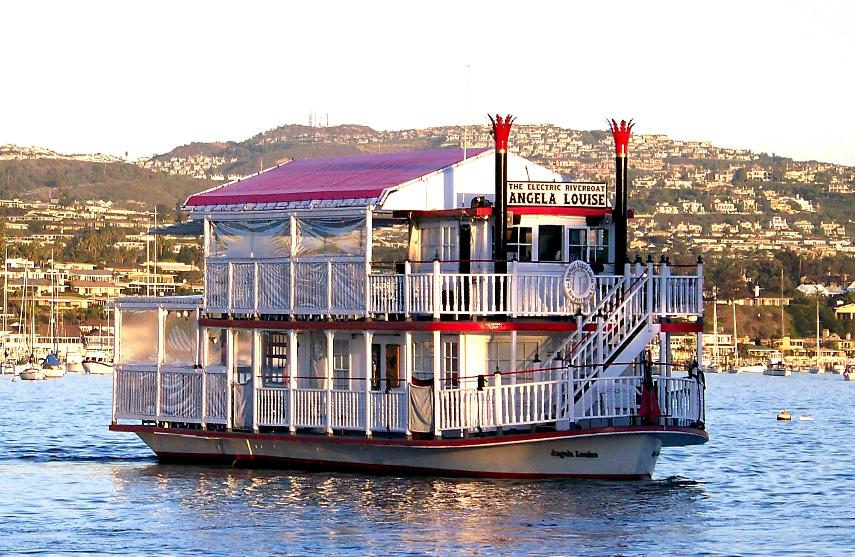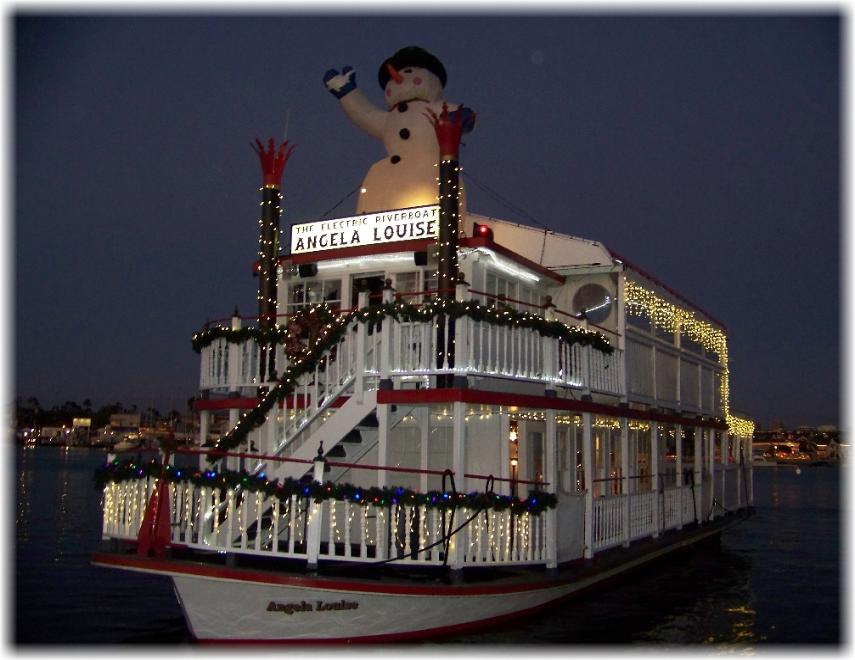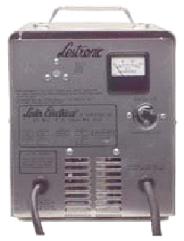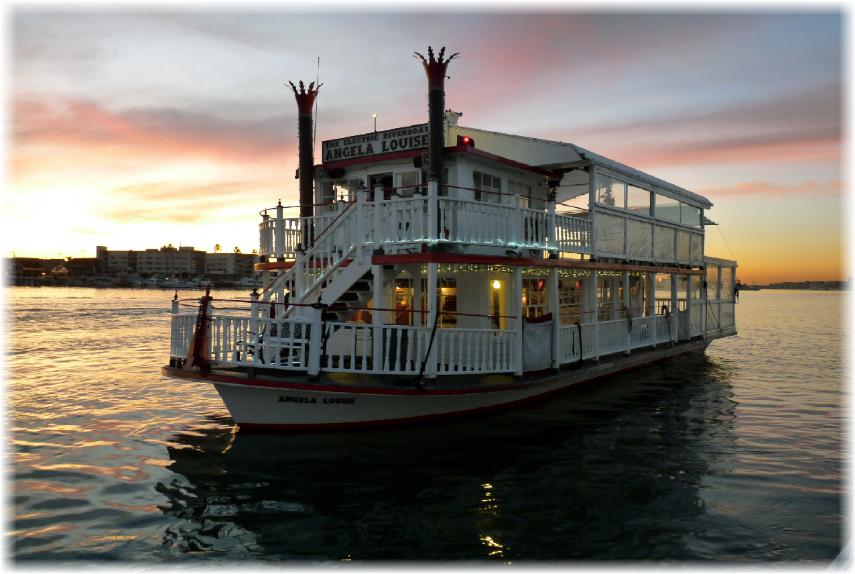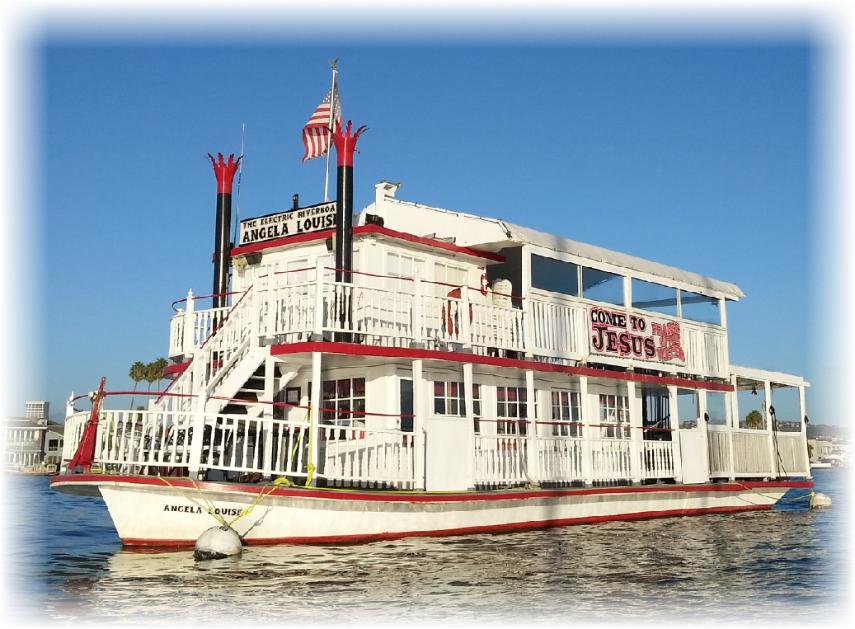The story of our effort dates to late 1998 and early 1999 when we began the rather costly process of adding a hybrid
power source to this 100 passenger Coast Guard certified vessel. A power source that previously was only used to propel
small craft -- up to 15 passengers or so -- through the water. That power is pure, clean, and electric. Not the 12 volt type
in the average car but a complex system of batteries and components that not only supply propulsion, but also, the 120
volts, AC current needed for what's called Ship's Systems -- a term meaning anything that operates on the same electric
current as most residential homes.
power source to this 100 passenger Coast Guard certified vessel. A power source that previously was only used to propel
small craft -- up to 15 passengers or so -- through the water. That power is pure, clean, and electric. Not the 12 volt type
in the average car but a complex system of batteries and components that not only supply propulsion, but also, the 120
volts, AC current needed for what's called Ship's Systems -- a term meaning anything that operates on the same electric
current as most residential homes.
| The Beginning Of the Electric Riverboat Angela Louise |



| SPECIAL THANKS TO: LESTER CHARGERS / TROJAN BATTERY COMPANY / TRACE ENGINEERING FOR THEIR GENEROUS SUPPORT |

After nearly one year of construction, modification, final approval by the United States
Coast Guard and tens of thousands of dollars later, the goal of propelling our vessel
through this harbor by clean electric power finally became a reality.
"Why?" is a question I hear a lot. Why add an environmentally friendly power source to a
vessel that runs well on diesel? Most folks tend to think that there'll be some form of
savings in reduced fuel costs, maintenance or a combination of those two. Actually, we
would have been miles and dollars ahead had we not added the electric system.
But, it wasn't about money. It was about not contributing to the harbor's fairly dismal
condition by adding more toxins; it was about achieving near-absolute silence from the
machinery while wedding vows were exchanged; it was about getting along with our
neighbors -- the people who have spent in many cases millions of dollars on water-side
homes; it was to make certain that while dining, diesel fumes didn't overtake the
fragrance of a finely prepared meal. It was just about social responsibility, really, and the
chance to do something completely unique.
Quickly, I want to add that, although government wasn't interested in sponsoring or even
acknowledging this demonstration project, the leadership at Trojan Battery were,
supplying us with all of the batteries used on board. For that matter, so were the people
at Trace Engineering: they make the power inverter system used aboard that converts
DC voltage to AC. And of course the good folks at Lester Electrical for the high power
battery chargers. They were all nice enough to sponsor our sophisticated electrical
system.
We weren't alone in the vision to make the Riverboat electric -- Because we and the US
Coast Guard are concerned about passenger safety, the plans had to be reviewed and
approved by them. They made their decision based on the uniqueness of the project
and were willing to let us do what we wanted to do in order to make this demonstration a
success.
Studies cited by the National Resources Defense Council show that Diesel exhaust
causes mutations in chromosomes and damage to DNA, and that the very fine particles
from the exhaust aggravate respiratory illnesses like bronchitis and emphysema.
Enough is enough: if we can show people how to mitigate diesel exhaust and noise the
better for the environment, the better for our passengers.
Sounds like a pretty straightforward approach, and like something that might work for
others, as well. But, that's not something that's likely to happen. There has to be a
reason to do something like this, and we tried to give the City Council of Newport Beach
the law change to give other operators a good reason and the incentive we didn't have.
This law change would have provided a negligible incentive to operators to convert to
non-diesel propulsion. The City Council apparently believed that it would have only
currently served one vessel operator, namely us. Well that's true for the immediate
future. But the idea is to promote conversion.
If it weren't for various forms of incentives and payments by the government the EV1
electric car would have never left the drawing board. You have to start somewhere: This
law change would have had virtually no impact on City revenues -- probably offsetting
any small incentive in added business and revenue through Sales Taxes -- something
the City has been losing out on for some time. The Coastkeeper, a prominent Orange
County organization that serves as guardian of the Newport Bay seemed to think it was
a pretty good idea, too. They're part of the National Alliance of Keepers headed by
Robert Kennedy.
No matter what the reason, the result is that this 100-passenger vessel operates without
diesel power. That means that there are no toxins being dumped into either the air or
the water or on our guests' dinners.
To date, we have had numerous bookings as a result of our unique system of
propulsion from those who are both ecologically minded as well as just like the idea of
holding an event without the associated noise and smoke of conventional propulsion.
We're proud of our accomplishment. We think that eventually more of these conversions
will occur - they must if the fragile balance of life and environment are to remain intact.
Thank you for your time.
Capt. Joe Warren,
Founder of the Electric Riverboat Angela Louise, OWNER 1996 - 2003
Coast Guard and tens of thousands of dollars later, the goal of propelling our vessel
through this harbor by clean electric power finally became a reality.
"Why?" is a question I hear a lot. Why add an environmentally friendly power source to a
vessel that runs well on diesel? Most folks tend to think that there'll be some form of
savings in reduced fuel costs, maintenance or a combination of those two. Actually, we
would have been miles and dollars ahead had we not added the electric system.
But, it wasn't about money. It was about not contributing to the harbor's fairly dismal
condition by adding more toxins; it was about achieving near-absolute silence from the
machinery while wedding vows were exchanged; it was about getting along with our
neighbors -- the people who have spent in many cases millions of dollars on water-side
homes; it was to make certain that while dining, diesel fumes didn't overtake the
fragrance of a finely prepared meal. It was just about social responsibility, really, and the
chance to do something completely unique.
Quickly, I want to add that, although government wasn't interested in sponsoring or even
acknowledging this demonstration project, the leadership at Trojan Battery were,
supplying us with all of the batteries used on board. For that matter, so were the people
at Trace Engineering: they make the power inverter system used aboard that converts
DC voltage to AC. And of course the good folks at Lester Electrical for the high power
battery chargers. They were all nice enough to sponsor our sophisticated electrical
system.
We weren't alone in the vision to make the Riverboat electric -- Because we and the US
Coast Guard are concerned about passenger safety, the plans had to be reviewed and
approved by them. They made their decision based on the uniqueness of the project
and were willing to let us do what we wanted to do in order to make this demonstration a
success.
Studies cited by the National Resources Defense Council show that Diesel exhaust
causes mutations in chromosomes and damage to DNA, and that the very fine particles
from the exhaust aggravate respiratory illnesses like bronchitis and emphysema.
Enough is enough: if we can show people how to mitigate diesel exhaust and noise the
better for the environment, the better for our passengers.
Sounds like a pretty straightforward approach, and like something that might work for
others, as well. But, that's not something that's likely to happen. There has to be a
reason to do something like this, and we tried to give the City Council of Newport Beach
the law change to give other operators a good reason and the incentive we didn't have.
This law change would have provided a negligible incentive to operators to convert to
non-diesel propulsion. The City Council apparently believed that it would have only
currently served one vessel operator, namely us. Well that's true for the immediate
future. But the idea is to promote conversion.
If it weren't for various forms of incentives and payments by the government the EV1
electric car would have never left the drawing board. You have to start somewhere: This
law change would have had virtually no impact on City revenues -- probably offsetting
any small incentive in added business and revenue through Sales Taxes -- something
the City has been losing out on for some time. The Coastkeeper, a prominent Orange
County organization that serves as guardian of the Newport Bay seemed to think it was
a pretty good idea, too. They're part of the National Alliance of Keepers headed by
Robert Kennedy.
No matter what the reason, the result is that this 100-passenger vessel operates without
diesel power. That means that there are no toxins being dumped into either the air or
the water or on our guests' dinners.
To date, we have had numerous bookings as a result of our unique system of
propulsion from those who are both ecologically minded as well as just like the idea of
holding an event without the associated noise and smoke of conventional propulsion.
We're proud of our accomplishment. We think that eventually more of these conversions
will occur - they must if the fragile balance of life and environment are to remain intact.
Thank you for your time.
Capt. Joe Warren,
Founder of the Electric Riverboat Angela Louise, OWNER 1996 - 2003


In 1996, Captain Joe Warren purchased the Carmela Bella, refurbished her
and renamed her ANGELA LOUISE. In 1999, The Riverboat was converted
into a Hybrid Electric Powered Vessel.
and renamed her ANGELA LOUISE. In 1999, The Riverboat was converted
into a Hybrid Electric Powered Vessel.
In 2003, Captain Rick Garcia purchased the Electric Riverboat Angela Louise and
moved her to the world famous FUN ZONE on Balboa Peninsula. she currently
operates in Newport Bay.
moved her to the world famous FUN ZONE on Balboa Peninsula. she currently
operates in Newport Bay.
